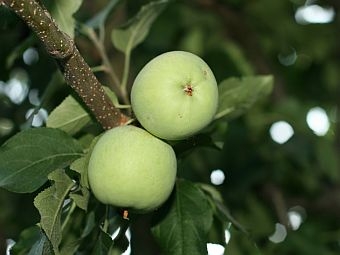 I’m Charlie Nardozzi and this is the Vermont Garden Journal. Of all the fruits, apples are the most interwoven with our folklore. From William Tell’s arrow, to Newton’s theory of gravity, to a man named Johnny seeding trees around a new country, apples are part of our culture. We love to grow apples partly because they’re perfectly suited to our northern climate. But often home owners get frustrated with their apple trees. Diseases and insects take their toll on these trees and fruits. There are solutions to these problems that make apple growing much more reasonable for the home gardener.
I’m Charlie Nardozzi and this is the Vermont Garden Journal. Of all the fruits, apples are the most interwoven with our folklore. From William Tell’s arrow, to Newton’s theory of gravity, to a man named Johnny seeding trees around a new country, apples are part of our culture. We love to grow apples partly because they’re perfectly suited to our northern climate. But often home owners get frustrated with their apple trees. Diseases and insects take their toll on these trees and fruits. There are solutions to these problems that make apple growing much more reasonable for the home gardener.
The first step is to grow dwarf or semi dwarf trees. These only grow 10 to 20 feet tall and produce fruit that is easy to reach, on trees that are easy to care for. Columnar trees, such as ‘Northpole’, grow only 8 feet tall, don’t branch out and produce a few dozen fruits along their trunk. Next, look for disease resistant varieties such as ‘Liberty’, ‘Williams Pride’ and ‘Macfree’ so you don’t have to keep spraying for diseases such as apple scab and powdery mildew all summer.
Insects are another issue. Although we don’t expect perfectly shaped fruits, one loaded with worms isn’t much fun either. There are some traps that make controlling the two main apple insects; maggots and codling moths, easier. Apple maggot traps are round, red balls coated with a sticky substance called tanglefoot. Hang 4 to 5 of these balls per tree now and the maggot fly will land on them to lay eggs, get stuck and die. Codling moth traps are a bit more sophisticated using sex pheromones to disrupt mating. Hang these traps, one per 6 trees, before bloom time and spray the trees with Bt soon after to kill young worms that might still be created.
For this week’s tip, spray lawns now with beneficial nematodes to kill Japanese beetle grubs that are near the soil surface and ready to emerge. Spray in the early evening and water the nematodes in well.
Next week on the Vermont Garden Journal I’ll be talking delphiniums. For now, I’ll be seeing you in the garden!
Resources:
Grow Organic Apples
IPM for Home Apple Growers